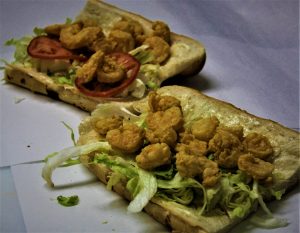I am sure you have heard the story before. It’s not a bad story, it pulls at the heart strings a bit, and provides a little local color too. But it is patently untrue. This tall-tale describes how the po-boy was invented in New Orleans during a street car strike. The story goes that restaurateurs felt sorry for the “poor boys,” on strike and offered them baguettes stuffed with what leftovers they had at hand, wrapped them in butcher’s paper and handed them out.
Give me a break! Don’t you know that the frugal French have been slicing open baguettes and filling them with all sorts of good things for countless generations? Perhaps what we fill our po-boys with is different from what our French friends might use, certainly charcuterie and a good, ripe local cheese would be their choice, but the basic idea, the concept of a po-boy is ancient. Sorry New Orleans, you just can’t claim that accolade.

No matter where this king of all sandwiches found it’s start, we are blessed with a bushel full of restaurants that make amazing po-boys. I can’t begin to name all of them, but the three that are at the top of my list are Bozo’s, BB’s and the Po-Boy Express.
So, just what does it take to make a great po-boy? The bread is critical, it can’t be too crusty, nor too soft,
If you have ever encountered a miserly made po-boy, one with only a scattering of fried shrimp or oysters, then you know one of the biggest mistakes some restaurants make. And I am not naming names. If the shrimp are not falling out the sides, then it Is not full enough. A po-boy is about abundance, it’s a two handed, portable meal.
If you know me at all, you know what is coming next: please do not overcook the seafood that you are going to stuff that po-boy with. Overcooking seafood ruins the texture and flavor. I abhor touch, tasteless shrimp or oysters. What a waste.
You know you are walking into a good po-boy place when you see a roll of paper towels on each table. Napkins just won’t do. Po-boys are inherently messy, fully dressed (if I have to explain the meaning of dressed to you, you are not from here), so a tomato or pickle is likely to escape and slid down your arm. I always insist on extra mayo for a shrimp or oyster po-boy and extra gravy on the roast beef or pot roast beef. The Po-boy Express in Ocean Springs goes through two gallons of gravy a day, so you know they are getting it right.
I absolutely love a good po-boy, but it’s got to be well built. Accept no substitutes, revel in the messiness of it, and pity those poor souls that have never had a good one. Yes, darlin, I want that po-boy pressed and dressed.